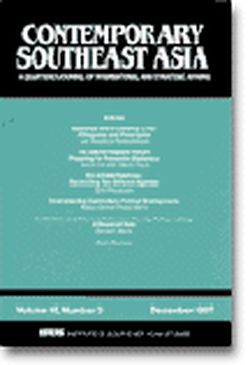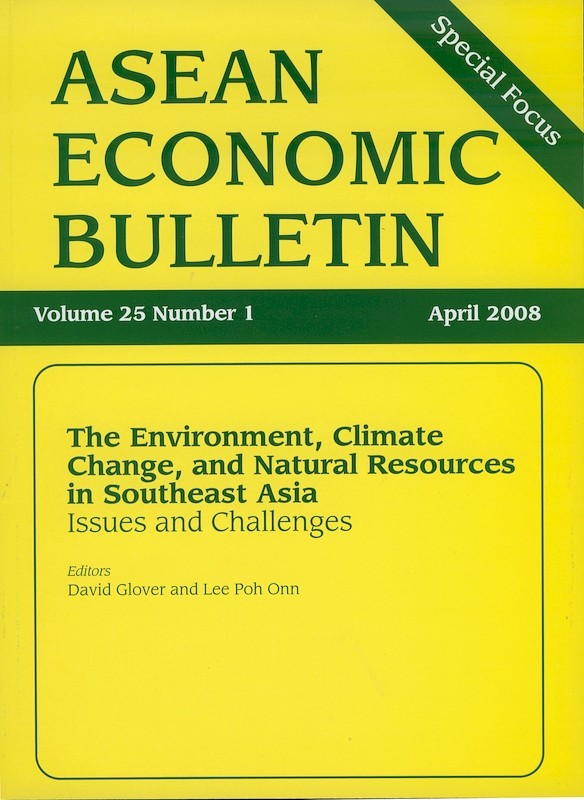ASEAN Economic Bulletin Vol. 9/2 (Nov 1992)

Date of publication:
November 1992
Number of pages:
152
Code:
AE9/2
Contents
-
Preliminary pages
- ARTICLES
-
Regionalization of Trade in the Asia-Pacific: A Statistical Approach, by Torsten Amelung, author see abstractDespite the integration of the East and Southeast Asian economies into the world economy, there is a clear trend towards regionalization of foreign trade in Asia-Pacific. A method that used hierarchical cluster analysis and bilateral trade flows has identified two economic regions in the Asia-Pacific: firstly a Northeast Asian region encompassing Korea, Taiwan, Japan, China, Hong Kong and the United States as a non-Asian nation, and secondly a Southeast Asian group of countries including Malaysia, Singapore, Indonesia and Thailand. Though the latter seems to overlap with the ASEAN group of countries, the analysis of trade links within the Southeast Asian group points to the fact that the trade integration within that group is not a result of institutional integration schemes but is due to the Singapore's role as a trade and service centre for the Southeast Asian region.
-
International Management Control in Multinational Corporations: The Case of Japanese Consumer Electronics Firms in Asia, by Schon Beechler, author see abstractThis article examines the issue of international management control by exploring how the managements of Japanese multinational corporations keep their geographically dispersed operating units around the globe working together towards a set of organizational objectives. First, the article describes a general theoretical framework which attempts to answer two fundamental questions concerning organizational control: (1) when will control be exercised by management? and (2) in situations where control should be exercised, what kind of control will be used? The propositions derived from this theoretical framework are tested in a study which examines how seven of the nine "electronics giants" in Japan control their transactions with their overseas subsidiaries in Southeast and East Asia.
-
Environmental Policy in OECD Countries: Lessons for ASEAN, by Peter Michaelis, author see abstractThis article aims at a critical discussion of environmental policies in OECD countries in order to assess whether such policies can be adopted in ASEAN countries facing similar environmental problems. After a short introduction to the theoretical background of environmental policy, it is shown that the need for such policy can be traced back to shortcomings of the price mechanism in dealing with environmental problems. Based on this observation, the goals and instruments of environmental policy are discussed from theoretical and empirical points of view. The gap between the theory of environmental economics and the real world of environmental policy is clearly demonstrated by a comprehensive overview of environmental policies in Germany and other OECD countries. While there are some promising applications of economic instruments, the economists ideal of an extensive system of environmental charges and marketable emission permits is far from being implemented. Finally, the applicability of OECD countries experience in environmental policy to ASEAN countries is discussed.
-
Policy Changes in Indonesian Public Enterprises during the Old Order and New Order Governments, by I Ketut T Mardjana, author see abstractIn Indonesia, the shift from the Old Order to the New Order Government in 1966 and thereafter was characterized by economic reforms, including reform of public enterprises. The first major reform in the area of public sector enterprises was restructuring a single form of public enterprises (Perusahaan Negara or PN) into three forms (Perjan, Perum and Persero). The second round of reform occurred recently in public enterprise restructuring and simplification of the system of control. Both the first and the second reforms were concerned with problems of inefficiency, with debureaucratization and decontrol being the remedies. In examining these approaches, this article argues that the type of relationship between government (the principal) and public enterprises (the agents) is more than likely the central difficulty of public enterprises in Indonesia. Therefore, improvement in public enterprise management and performance probably depends on improving the relationship between principal and agent.
-
Malaysia's Public Enterprises: A Performance Evaluation, by Abdul Hafeez Shaikh, author see abstractMalaysia's public enterprises (PEs) account for almost one-third of the country's GDP. This share is among the highest in the world, and clearly surpasses the importance of PEs in other ASEAN countries. In this article the performance of Malaysia's PEs are analysed. The evaluation of performance is based on trends in the number of profitable PEs; trends in the rates of return; and comparisons with private sector on the basis of profitability and cost efficiency. It is found that PEs had low rates of return during the entire period of the study, and well below the opportunity costs of funds. An estimate of the foregone output due to the inferior performance of PEs is derived and the maximum estimates are found to approach ten per cent of the GDP in 1986. Explanations for low performance, in terms of theoretical reasoning, government policies, and the Malaysian institutional setting, are also provided.
-
The Strategic Dimension of the "East Asian Developmental States", by Ng Chee Yuen, Sueo Sudo, Donald K Crone , authors see abstractThis article examines common strategic factors associated with the dynamic economic development of five Asian countries, namely, South Korea, Singapore, Malaysia, Thailand and Indonesia. Despite some obvious differences, these five countries have enough in common that they can be classified as the "East Asian developmental states". The inquiry found that the following factors are critically important in successfully pursuing development strategies: (1) state capacity; (2) mixed-market economies; (3) outward-looking orientation; (4) effective macro-economic policies; and (5) efficient infrastructure. The article concludes that contrary to the neoclassical policy analysis these East Asian developmental states exercise pervasive government intervention.
-
DOCUMENTATION: Joint Communiqu of the 25th ASEAN Ministerial Meeting, Manila, 21-22 July 1992.
-
DOCUMENTATION: ASEAN Declaration on the South China Sea
-
DOCUMENTATION: Joint Statement at the Asia-Pacific Economic Co-operation Ministerial Meeting, Bangkok, 10-11 September 1992.
-
DOCUMENTATION: Bangkok Declaration on Asia-Pacific Economic Co-operation (APEC) Institutional Arrangements
-
DOCUMENTATION: Accompanying Statement of the 9th General Meeting of the Pacific Economic Co-operation Council, San Francisco, 23-25 September 1992.
-
DOCUMENTATION: San Francisco Declaration. Open Regionalism: A Pacific Model for Global Economic Co-operation
-
DOCUMENTATION: Summary Record of the ASEAN Roundtable: 25 Years of ASEAN. AFTA: The Way Ahead, Singapore, 3-5 September 1992.
-
BOOK REVIEW: Fiscal Incentives and Economic Management in Indonesia, Malaysia and Singapore, by M G Asher, R C Rolt, M Ariff and M H Khan; Politics and Policy Making in Developing Countries, edited by G M Meier; Reaching Out Effectively: Improving the Design, Management and Implementation of Poverty Alleviation Programmes, edited by J P Getubig, Jr. and M K Shams Politics and Policy Making in Developing Countries. Edited by G M Meier Reaching Out Effectively: Improving the Design, Management and Implementation of Poverty Alleviation Programmes. Edited by J P Getubig, Jr and M K Shams, by Robert L Curry, Jr., author
-
BOOK REVIEW: Economic Crisis and Policy Choice: The Politics of Adjustment in the Third World, edited by Joan Nelson, by Rolf J Langhammer, author
-
BOOK REVIEW: Technology and Culture in a European Context, by J Orstrom Moller, by Hanns Gunther Hilpert , author
-
BOOK REVIEW: Indonesia: Sustainable Development of Forests, Lands, and Water, A World Bank Country Study, by Churai Tapvong, author
-
Conferences, Workshops and Seminars
-
ASEAN Chronology 1992
-
Some Recent Publications


